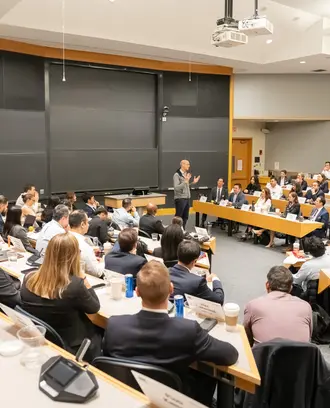Miranda “MJ” Jamieson is Senior Director, Global Marketing—Robotics at Johnson & Johnson MedTech and a member of the MIT Executive MBA Class of 2025.
Note: The following interview has been edited for clarity.
Why did you choose the MIT EMBA? What stood out about this program when you were doing research?
MJ Jamieson, EMBA '25
I was at a place in my career where I was looking to round out some of my knowledge. Given that I had a couple of engineering degrees under my belt and professional experience in R&D, business development, and strategic marketing, I was hungry to expand my knowledge of finance. In my research, I saw unique and interesting classes like System Dynamics, learning about virtuous and vicious flywheels, and how you can prime a business if you have the right insights and the right framework.
I also learned more about the Innovation-Driven Entrepreneurial Advantage (IDEA) module at Sloan. The ability to do a weeklong, intensive program where we incubate our own startup idea with support from professors and other entrepreneurs along the way was incredibly interesting to me. I’m currently employed at a major corporation, but adopting an entrepreneurial mindset is essential for fostering innovation, even within a large organization.
How has the focus on Action Learning impacted your experience with the curriculum and the program?
Coming from an engineering background, I'm all about the active application of knowledge. The theoretical aspect of basic science is incredibly important to understand, but where I thrive is applying that theory to solve problems, which I discovered in Organizational Processes.
One key framework I’ve actioned multiple times since learning is stakeholder analyses. As a trained engineer, I never learned to ask about the key stakeholders involved in decision-making to move an investment or project forward. It's this ability to not only understand the what of the projects and the initiatives we're trying to pioneer and champion at work, but also the how. Understanding how decisions are made through stakeholders’ network maps is critical to successful project execution.
What’s something you found to be underrated or surprising about the MIT EMBA?
The piece I think is underrated is how MIT can really support you in developing your quantitative approach to business. It starts with an optional Math Primer, an online self-paced educational platform, before you matriculate. Once in class, the professors have a very progressive teaching style when it comes to this quantitative piece. Regardless of your background, the professors meet you where you're at and sequentially build upon your knowledge, while still providing challenging educational opportunities to students who have stronger quant backgrounds. In general, the ability to become strong quantitatively, through classes like Data, Models, and Decisions and the Business Analytics Certificate, regardless of your starting point, was something with which I was pleasantly surprised.
What skills or insights gained through the program have had the biggest impact on your career so far?
It's nothing written in a syllabus or curriculum. What I learned through the format of the program was the ability to feel comfortable delegating within a team, and perhaps more importantly, the ability to ask for help.
Early on, one of the professors told us, “What got you here will not get you there.” We all enter the program with meaningful professional success, but we're in this program to grow and have a bigger impact on our business and the world around us. Working within a hierarchical workplace, putting your head down, and producing high quality work will get you far—but not far enough. Through my experience of working with peers in highly collaborative study groups, I was given opportunities to both lead like a CEO and to be a ‘worker among workers’ in a support role capacity. I was given chances to support study group members when their schedules were hectic and to accept help when my own work schedule ramped up. The ability to ask for help has made me a stronger leader, and hopefully set a good example for my teams.
What was it like in a study group with professionals from different industries, locations, and backgrounds?
If you asked me to put together my own group, I may have never chosen the people I was placed with, and perhaps shame on me for that. The forced diversity of thought, profession, culture, language, etc., brought so much richness to our conversations and undoubtedly strengthened the work product we delivered.
I learned so much from the people in each and every one of my study groups. Not only was their education and career background different than mine, their lived experience, and therefore, their ways of thinking also brought so much dimension to our interactions. Where I may be a female leader in the male-dominated industry of surgery with a background in product innovation and commercial marketing, others were flying in from different continents with exceptionally strong finance, industrial, and tech backgrounds. We were able to complement each other's skill set which fostered great collaboration and learning.
What’s one piece of advice you'd give to a prospective MIT EMBA student?
I didn't know if it was right for me. I didn't know if I could hang in the program after being out of school for some time, given the rigor of the academic work. I didn't know if I'd be a compelling candidate given my background in engineering and marketing.
So the one piece of advice I have, from the bottom of my heart, is to believe in yourself. You have a place in the program. No matter how untraditional your background, you’d bring great value here. It's all about diverse experiences. Don’t be limited by a preconceived notion of the typical business school student, because MIT Sloan is not a typical business school. The diversity in the class is what really makes the experience so rich and rewarding. Believe in yourself, trust that you bring great value to the program, and good things will happen!



